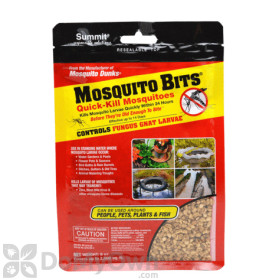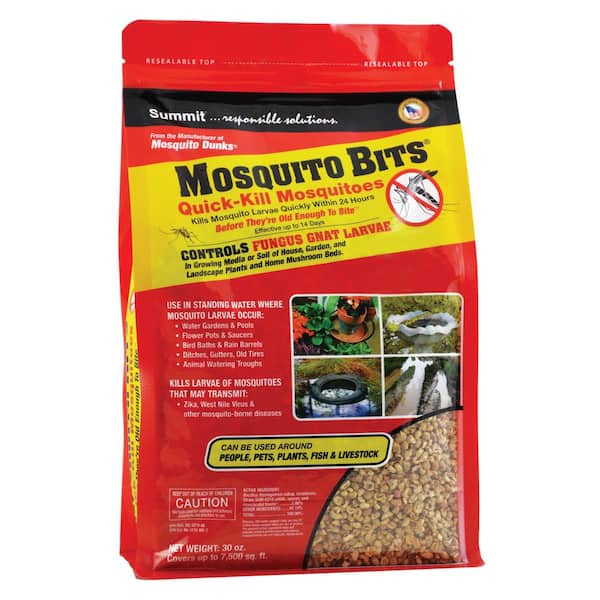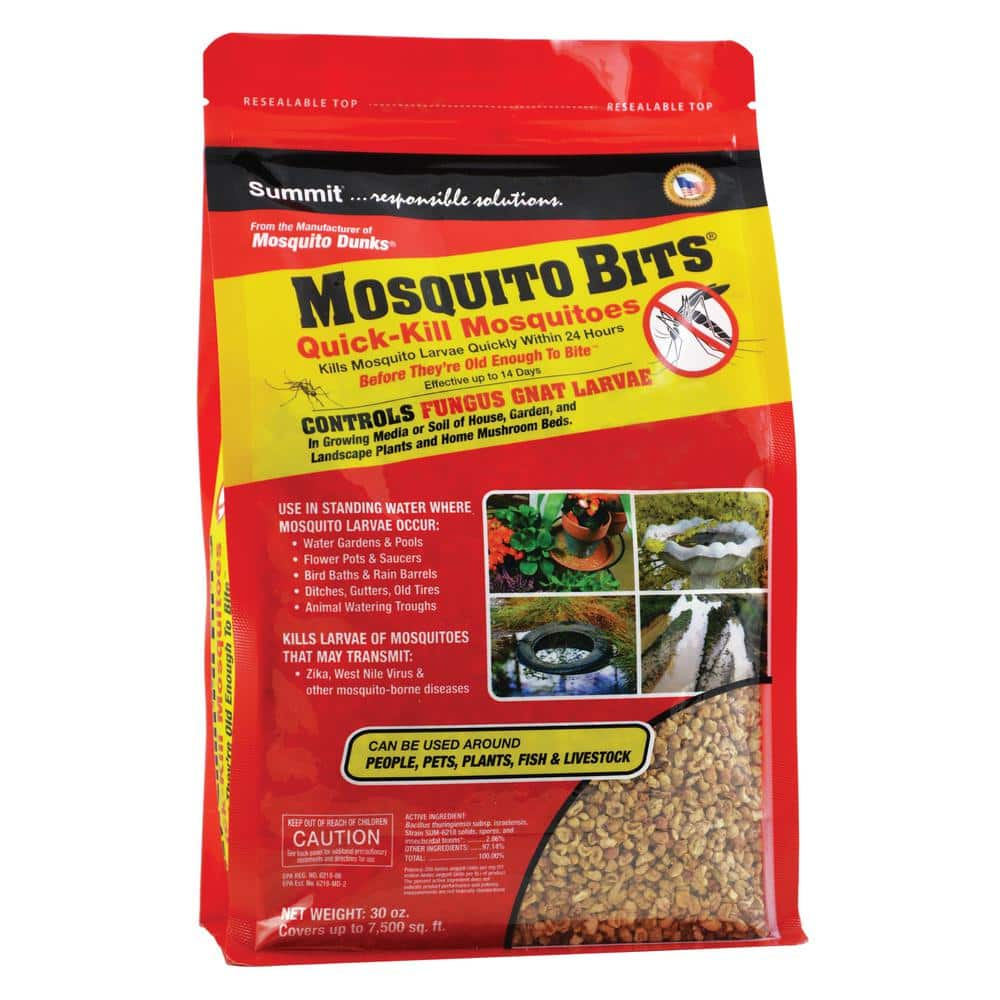Yes, Mosquito Bits can be safely used in a vegetable garden as they are non-toxic to plants and humans. Mosquito Bits are a selective biopesticide that effectively controls mosquitoes while being eco-friendly.
In organic vegetable gardens, the use of Mosquito Bits provides a safe and efficient method of mosquito control without posing any risks to edible plants or water supplies. This eco-friendly approach ensures that beneficial insects and plants remain unharmed while effectively managing mosquito populations.
By incorporating Mosquito Bits into the soil or watering system, vegetable gardeners can maintain a healthy and thriving garden environment while effectively controlling mosquitoes.
Introduction To Mosquito Bits
Mosquito bits, also known as BTI (Bacillus thuringiensis israelensis), are a biological larvicide used to control mosquito populations. These small granules contain a naturally occurring bacteria that specifically targets and kills mosquito larvae, making them an effective and environmentally friendly solution for mosquito control.
What Are Mosquito Bits?
Mosquito bits are small, donut-shaped granules that contain the active ingredient Bacillus thuringiensis israelensis (BTI). When applied to standing water, the granules release BTI, which is toxic to mosquito larvae but harmless to other organisms. This targeted approach makes mosquito bits a safe and effective option for controlling mosquito populations without harming beneficial insects or other wildlife.
Active Ingredients And Their Effects
The active ingredient in mosquito bits, BTI, works by producing toxins that specifically target the digestive systems of mosquito larvae. Upon ingestion, the toxins disrupt the larvae’s gut function, leading to their eventual death. Importantly, BTI is non-toxic to humans, pets, and beneficial insects, making it a safe and environmentally friendly option for mosquito control in vegetable gardens.

Credit: www.domyown.com
Safety Profile
When considering the use of mosquito bits in a vegetable garden, it’s important to understand their safety profile. This includes their impact on humans and pets, as well as their environmental considerations.
Impact On Humans And Pets
Mosquito bits, also known as BTI (Bacillus thuringiensis israelensis), are generally considered safe for humans and pets. BTI specifically targets the larvae of mosquitoes and fungus gnats, posing minimal risk to other organisms. When used as directed, mosquito bits are not harmful to people, pets, or beneficial insects such as honeybees.
Environmental Considerations
One of the key environmental benefits of using mosquito bits in a vegetable garden is their minimal impact on the ecosystem. BTI is a highly selective biopesticide that is non-toxic to plants and other beneficial insects. This makes it an eco-friendly form of mosquito control, particularly suitable for organic gardening practices. Additionally, BTI can be applied safely to standing water where mosquitoes lay eggs without causing harm to food crops or water supplies, making it a viable option for sustainable pest management.
Usage In Vegetable Gardens
Mosquito bits, also known as Bacillus thuringiensis israelensis (BTI), can be effectively used in vegetable gardens to control mosquito larvae without harming the plants or the environment. When used correctly, mosquito bits are a safe and eco-friendly option for pest control in organic vegetable gardens.
Application Methods
There are several application methods for using mosquito bits in vegetable gardens:
- Top-Dressing: Sprinkle the mosquito bits directly onto the soil surface around the plants.
- Mixing with Soil: Mosquito bits can be mixed with potting soil before planting to release BTI when the plants are watered.
- Watering: After mixing with soil, subsequent watering will wash the BTI below the soil surface to eliminate fungus gnat larvae.
Dosage And Frequency
It’s important to use the correct dosage and apply mosquito bits at the right frequency to ensure effective pest control without overusing the product:
| Vegetable Type | Dosage | Frequency |
|---|---|---|
| Leafy Greens | 1 tablespoon per 5 square feet | Every 2 weeks |
| Root Vegetables | 2 tablespoons per 5 square feet | Every 3 weeks |
| Fruit-Bearing Plants | 3 tablespoons per 5 square feet | Every 4 weeks |

Credit: www.homedepot.com
Effectiveness Against Pests
Effectively combat pests in your vegetable garden with Mosquito Bits. These eco-friendly biopesticides are safe for plants, humans, and beneficial insects, providing a non-toxic solution for mosquito control. Mix with soil to target fungus gnat larvae without harming your crops.
Target Pests
Mosquito bits are highly effective in controlling several pests in the vegetable garden, including fungus gnats, mosquitoes, and other pests that breed in standing water. The active ingredient, Bacillus thuringiensis israelensis (BTI), is a naturally occurring bacterium that specifically targets the larvae of these pests, preventing them from developing into adults.Efficacy Studies And Results
Studies have shown that mosquito bits are an effective method for controlling pests in the vegetable garden. In one study, the use of mosquito bits reduced the number of fungus gnats in the soil by up to 80%. Another study found that mosquito bits were highly effective in controlling mosquito larvae in standing water. Additionally, mosquito bits have been shown to be safe for use in organic farming operations and have no toxicity to people, plants, or other beneficial insects.When using mosquito bits in the vegetable garden, it is important to follow the instructions carefully and apply them only to areas where pests are present. Mosquito bits can be added to standing water, mixed with soil, or sprinkled on top of soil. They should be reapplied every two weeks for best results.In conclusion, mosquito bits can be a safe and effective method for controlling pests in the vegetable garden. With their targeted approach and lack of toxicity to people and plants, they offer a viable alternative to traditional chemical pesticides. By incorporating mosquito bits into your pest management strategy, you can enjoy a bountiful harvest while keeping unwanted pests at bay.Compatibility With Organic Gardening
Mosquito Bits, such as BTI, are safe for organic vegetable gardens as they are non-toxic to humans, plants, and beneficial insects. They provide an eco-friendly solution for mosquito control without harming crops or water supplies. Mixing Mosquito Bits with soil can effectively eliminate fungus gnat larvae in vegetable gardens.
Organic Certifications
If you are an organic gardener, you may be wondering if mosquito bits are compatible with organic gardening practices. The good news is that mosquito bits are a safe and effective way to control mosquito larvae without harming beneficial insects or other wildlife. In fact, mosquito bits are approved by the Organic Materials Review Institute (OMRI) for use in organic gardening.Compliance With Farming Standards
When it comes to using mosquito bits in your vegetable garden, you can rest easy knowing that they are compliant with farming standards. Mosquito bits contain a naturally occurring bacteria called Bacillus thuringiensis israelensis (BTI), which is highly selective and non-toxic to humans, plants, and other beneficial insects. This makes mosquito bits a safe and eco-friendly form of pest control that can be used in organic farming operations.If you’re concerned about the safety of mosquito bits, it’s important to note that they are EPA-registered and approved for use in residential, commercial, and agricultural settings. When used as directed, mosquito bits can be applied safely to standing water where mosquitoes lay eggs without causing harm to food crops or water supplies.In addition to being safe for humans and the environment, mosquito bits are also easy to use. Simply sprinkle the recommended amount of mosquito bits on the surface of the water where mosquito larvae are present. The BTI in the mosquito bits will be ingested by the larvae, causing them to die within 24 hours.In Conclusion
In summary, mosquito bits can be used in vegetable gardens with no harm to plants, people, or other wildlife. They are compatible with organic gardening practices and comply with farming standards, making them a safe and effective form of pest control. Whether you’re dealing with mosquito larvae in your backyard pond or in standing water on your farm, mosquito bits are a simple and eco-friendly solution that can help you control these pests and enjoy a healthy, thriving garden.
Credit: m.youtube.com
Impact On Plant Health
Mosquito bits, also known as BTI (Bacillus thuringiensis israelensis), are a popular choice for controlling mosquito larvae in standing water. However, when it comes to using mosquito bits in a vegetable garden, it’s crucial to consider their impact on plant health. Let’s explore how the application of mosquito bits can affect the overall well-being of your vegetable plants.
Nutrient Absorption
When mosquito bits are applied in a vegetable garden, they release BTI, which targets the larvae of mosquitoes and fungus gnats. As a result, the presence of BTI in the soil can potentially affect the nutrient absorption process in plants. The targeted pests may disrupt the nutrient uptake, leading to nutritional deficiencies in the vegetable plants.
Growth And Yield Outcomes
The use of mosquito bits can have varying effects on the growth and yield outcomes of vegetable plants. While the targeted control of pests can contribute to a healthier growing environment, the potential impact on the soil’s microbial activity and ecosystem balance should be considered. The disruption of the soil’s natural balance may influence the overall growth and productivity of the vegetable garden.
User Experiences
Mosquito Bits are safe for vegetable gardens as they are non-toxic to plants and beneficial insects. When mixed with soil, the BTI in Mosquito Bits effectively eliminates fungus gnat larvae, making it an eco-friendly pest control option for edible plants.
Case Studies
Mosquito bits have been successfully used in vegetable gardens by many users, with positive outcomes in controlling insect pests without harming the plants or the environment. Let’s take a look at some real-life examples of how users have experienced the benefits of using mosquito bits in their vegetable gardens.
Personal Testimonials
Users have shared their personal experiences with using mosquito bits in their vegetable gardens, highlighting the effectiveness and safety of this method. These testimonials provide valuable insights into how individuals have found mosquito bits to be a beneficial solution for pest control in their vegetable gardens.
Alternative Solutions
When it comes to controlling pests in your vegetable garden, it’s important to explore alternative solutions that are effective and safe for your plants, as well as the environment. One such alternative is the use of mosquito bits, which are becoming increasingly popular for their effectiveness in controlling pests while being safe for use in vegetable gardens. Let’s take a closer look at some alternative solutions for pest control in your vegetable garden.
Natural Remedies
Many gardeners prefer to use natural remedies for pest control in their vegetable gardens. Natural remedies, such as mosquito bits, offer a safe and environmentally friendly way to manage pests without using harmful chemicals. In addition to mosquito bits, other natural remedies like neem oil, garlic spray, and companion planting can also be effective in controlling pests in the vegetable garden.
Comparative Analysis With Other Products
When comparing mosquito bits with other pest control products, it’s important to consider their effectiveness, safety, and impact on the environment. Unlike chemical pesticides, mosquito bits are non-toxic to humans, plants, and beneficial insects, making them a safe and eco-friendly option for pest control in vegetable gardens. Additionally, mosquito bits are EPA-registered for use in residential, commercial, and agricultural settings, including organic farming operations.
Frequently Asked Questions
Are Mosquito Bits Toxic To Plants?
Mosquito bits are safe for plants as they are a non-toxic biopesticide, making them eco-friendly and harmless to plants.
Is Bti Safe For Edible Plants?
Yes, Bti is safe for edible plants as it is non-toxic to humans, plants, and beneficial insects.
Can I Mix Mosquito Bits With Soil?
Yes, you can mix mosquito bits with soil. The bits release BTI when watered, killing fungus gnat larvae.
Conclusion
Mosquito Bits are a safe and eco-friendly option for controlling mosquitoes in vegetable gardens. They are non-toxic to humans, plants, and beneficial insects. By effectively targeting mosquito larvae, Mosquito Bits can help protect your crops without posing any risks to your garden or the environment.
Related posts:

I’m MD Tanvir, and I bring years of expertise gained from working closely with pest control companies to the forefront. My journey in the industry has inspired me to launch Bug Battler, a platform aimed at equipping people with the know-how to combat pests autonomously. Through Bug Battler, I aim to empower individuals with practical insights to tackle pest infestations effectively.

